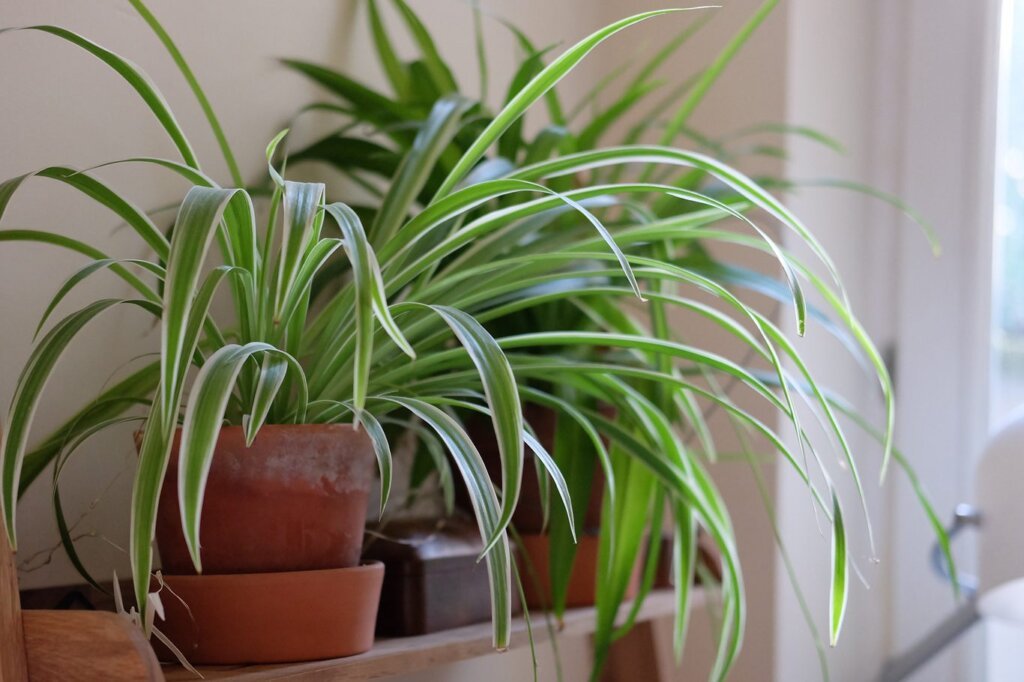When choosing houseplants for a home with children, safety is just as important as beauty. One of the most popular indoor plants today is the Spider Plant. A low-maintenance, air-purifying green companion. But many parents wonder: Is the spider plant safe for children?
Let’s explore the facts and clear up any confusion about whether the spider plant poses any risk to young kids.
What Exactly Is a Spider Plant?
The Spider Plant (Chlorophytum comosum) is a hardy indoor plant recognized by its long, arching green leaves with white or yellow stripes. It produces baby plants or “pups” that dangle from the parent plant, resembling little spiders—hence the name.
This plant is loved for many reasons:
- It’s beginner-friendly and doesn’t demand much care.
- It helps purify the air by removing indoor pollutants.
- It grows well in low to moderate light conditions.
It’s no surprise that it’s a go-to plant for homes, but what about homes with kids?
Is Spider Plant Toxic to Kids?
The good news is: Spider Plants are not toxic to children.
According to plant safety resources like the ASPCA and various horticultural studies, spider plants are categorized as non-toxic to humans. That means if a child happens to touch or even nibble on a leaf, it’s highly unlikely to cause serious harm.
However, this doesn’t mean it should be consumed freely. In rare cases, eating parts of the spider plant may lead to mild stomach discomfort, such as:
- A bit of nausea
- Soft stools
- Slight tummy upset
These symptoms usually go away on their own and are not dangerous.
Why the Concern? Myths vs. Reality
Some concerns stem from the spider plant’s effect on cats. It contains natural compounds that may cause a mild, harmless high in felines—similar to catnip. But these substances do not affect humans the same way.
There’s no scientific proof suggesting that these compounds can cause any hallucinations or toxic effects in children or adults.
What Other Parents Are Saying
Many plant-loving parents trust spider plants in their family spaces. Based on online reviews and feedback from plant communities, this plant is considered very safe.
“My toddler once chewed on a piece of our spider plant. We called the pediatrician, and they assured us it was harmless. He didn’t even get sick.” – Sara, mom of two
“I have several spider plants at home. They’re hanging up high, but I don’t worry even if the kids pull on a leaf now and then.” – Daniel, father and plant hobbyist
These experiences reinforce what experts confirm: spider plants are generally a safe and smart choice for households with young children.
How to Make Spider Plants Even Safer at Home
Even though the spider plant is non-toxic, you can still take simple precautions to avoid accidents:
1. Place Plants in Hanging Baskets
Using hanging planters or placing them on high shelves keeps them out of reach from toddlers and babies.
2. Teach Your Kids About Plants
Help your children understand the difference between looking at and eating plants. This builds respect and curiosity in a healthy way.
3. Use Chemical-Free Soil and Fertilizers
Make sure you’re not using any toxic pesticides or fertilizers on the plant. Always opt for child-safe gardening products.
4. Watch for Allergies (Rare but Possible)
Some children may have skin sensitivity or allergies to plant sap, although this is uncommon with spider plants. If irritation occurs, rinse with water and consult your pediatrician.
Spider Plant vs. Other Indoor Plants (Child-Safety Comparison)
To help you choose wisely, here’s a quick comparison of the spider plant with other popular houseplants:
| Plant Name | Safe for Kids? | Care Level | Air-Purifying? |
| Spider Plant | Yes | Easy | Yes |
| Snake Plant | No | Easy | Yes |
| Peace Lily | No | Moderate | Yes |
| Areca Palm | Yes | Easy | Yes |
| Pothos | No | Easy | Yes |
As shown, the spider plant ranks among the safest options for families with children.
Are Spider Plants Safe for Babies and Toddlers?
Yes, spider plants are generally safe for both babies and toddlers. Since they are non-toxic to humans, touching or nibbling a leaf is not harmful. However, babies and toddlers love to explore by putting things in their mouths, so it’s best to keep the plant out of reach. Hanging baskets or shelves are great solutions for nurseries or play areas.
Can Kids Be Allergic to Spider Plants?
Allergies to spider plants are extremely rare, but not impossible. A child with very sensitive skin may experience mild irritation if they rub the sap directly on their skin. If this happens, simply wash the area with soap and water. If your child has known plant allergies, monitor them closely when introducing any new houseplant.
Child-Friendly Alternatives to Spider Plants
If you’re looking for other non-toxic indoor plants safe for families with young children, here are some excellent choices:
- Areca Palm – Pet- and kid-safe, adds a tropical touch.
- Parlor Palm – Easy-care and safe for little hands.
- Calathea (Prayer Plant) – Known for its patterned leaves and safety.
- Boston Fern – Lush and safe for curious kids.
These plants, like the spider plant, bring greenery indoors without posing risks.
FAQs About Spider Plant Safety
Can spider plants cause poisoning in children?
No, spider plants are classified as non-toxic and do not cause poisoning in kids.
What happens if my child eats a spider plant leaf?
At most, they may experience mild stomach upset such as soft stools or slight nausea, but it usually passes quickly.
Are spider plants safe for nurseries or playrooms?
Yes, spider plants are safe to keep around children, especially if placed in a hanging basket or on a high shelf.
Which indoor plants should parents avoid?
Parents should avoid toxic plants such as Peace Lilies, Pothos, and Snake Plants, which can be harmful if ingested.
Final Thoughts: Is the Spider Plant Right for Your Family?
In short: Yes, spider plants are a great choice for homes with children.
They’re easy to care for, attractive, and non-toxic, making them ideal for busy parents who still want to enjoy a bit of greenery indoors. While you should always keep an eye on very young kids and discourage plant tasting, the spider plant poses no serious health risks.





